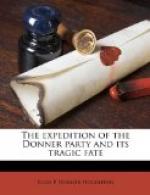It must have been our bad day, for Georgia felt her very first bite from the strap that afternoon, and on the way home volunteered not to tell on me, if grandma did not ask. Yet grandma did, the first thing. And when Georgia reluctantly said, “Yes,” grandma looked at me and shook her head despairingly; but when I announced that I had already had two strappings, and Georgia one, she burst out laughing, and said she thought I had had enough for one day.
A few weeks later, the large boys drove the master out of school on account of his cruelty to a little fellow who had played truant.
In that dingy schoolroom, Georgia and I later attended the first Protestant Sunday school and church service held in Sonoma.
CHAPTER XXV
FEVER PATIENTS FROM THE MINES—UNMARKED GRAVES—THE TALES AND TAUNTS THAT WOUNDED MY YOUNG HEART.
A short experience in the mines cured grandpa’s “mining fever,” but increased his rheumatism. The accounts he brought of sufferings he had witnessed in the camps prepared us for the approaching autumn’s work, when many of the happy fellows who had started to the gold-fields in vigorous health and with great expectations returned haggard, sick, and out of luck.
Then was noble work done by the pioneer women. No door was closed against the needy. However small the house might be, its inmates had some comfort to offer the stranger. Many came to grandma, saying they had places to sleep but begging that she would give them food and medicine until they should be able to proceed to San Francisco.
Weary mortals dragged their aching limbs to the benches under her white oak tree, dropped upon them, with blankets still across their shoulders, declaring they could not go another rod. Often, she turned her face aside and murmured, “God help the poor wanderers”; but to them she would say encouragingly, “You be not very sick, you will soon be rested. There be straw in the stack that we will bring for your bed, and me and the children will let you not go hungry.”
Ere long, beds had to be made on the floor of the unfinished house. More were needed, and they were spread under the great white oak.
On a block beside each fever patient stood a tin cup, which Georgia and I were charged to keep full of cold water, and it was pitiful to see the eyes of the sick watch the cooling stream we poured. Our patients eagerly grasped the cup with unsteady hands, so that part of its contents did not reach the parched lips. Often, we heard the fervid prayer, “God bless the women of this land, and bless the children too!”
Soon we learned to detect signs of improvement, and were rejoiced when the convalescents smiled and asked for more to eat. Grandma carried most of the food to them and sent us later for the empty dishes.




